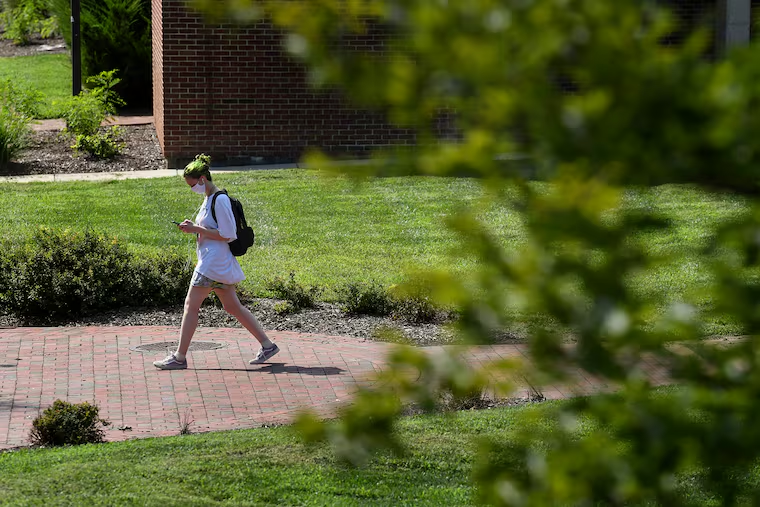College students are being told to report people who say ‘divisive’ things. It’s an attack on freedom.
On college campuses, students are being encouraged to report professors who say "divisive" things. Aren't we supposed to be a free society?

Last month, Tennessee’s Republican-led legislature passed a law inviting college students to report teachers who instruct “divisive concepts.” If your history professor says that one race is “inherently privileged” or that America is “fundamentally or irredeemably racist or sexist” — both prohibited claims in Tennessee classrooms — you can report her to your school, which is, in turn, required to report her to the state.
“This sounds like fascism, this sounds like authoritarianism,” complained Democratic State Rep. Justin Jones, one of two Black lawmakers whom the legislature recently expelled for joining a protest calling for stricter gun laws, and then reinstated. “This does not sound like democracy or freedom.”
He’s right. So why are our universities — which are mostly operated and staffed by Democrats — creating their own surveillance procedures, which encourage us to inform on each other?
I’m talking about bias reporting systems (BRSs), which encourage students to report “bias incidents” to the school and have become ubiquitous on American campuses. They’re not nearly as dangerous as Republican-sponsored measures to constrain teachers, but they share the same goal: to root out the bad ideas that lurk among us.
And you can’t have a free university — or a free society — on those terms.
You can’t have a free university — or a free society — on those terms.
According to a 2022 survey of 821 colleges and universities, over half of the institutions have established some kind of BRS. For example, the University of Tennessee at Knoxville — in the same state that bars the teaching of “divisive concepts” — has a “Bias Education and Response Team” that solicits complaints and suggests “disciplinary sanctions” against alleged offenders.
Never mind that a federal court declared in 2019 that BRSs impose an “objective chill” on speech via “implicit threat of punishment and intimidation.” Nobody can be quite sure what constitutes a “biased” remark, any more than we can readily identify a “divisive” one. So we shouldn’t allow any authority — inside the university, or outside it — to decide which is which.
But that’s precisely what BRSs do. At the University of Northern Colorado, a student filed a BRS complaint against a professor who raised questions about transgender rights in class; in response, a university official suggested that the professor “avoid the topic” for the rest of the semester.
At the University of Maryland, campus police were summoned after a bias report against students playing a video game that required them to come up with off-color responses to question prompts. And at Wake Forest University, officials investigated an Instagram post that parodied Donald Trump by proclaiming that a candidate for student government would “build a wall” between Wake Forest and Winston-Salem State University, a historically Black institution.
Some readers decried the satirical post as racist, which I can certainly understand. But I can’t understand why we would empower university administrators to make that determination or devise sanctions for it, especially at a moment when free speech is under massive assault from the political right.
» READ MORE: Why I didn’t sign the free speech petitions at Penn | Jonathan Zimmerman
Sixteen states have banned critical race theory, which is also in the eye of the beholder: If you don’t like something, call it CRT. In just the first three months of last year, more than a dozen states introduced bills to restrict discussions of gender identity and LGBTQ issues. Originally targeted at kindergarten through third-grade classrooms, Florida’s so-called “Don’t Say Gay” rule was recently expanded to bar the topic from all grades.
Florida’s GOP-led legislature recently passed a law allowing students to record professors in class, “as evidence in, or in preparation for, a criminal or civil proceeding.”
A conservative think tank in Nevada suggested that teachers be required to wear body cameras, to ensure they don’t teach CRT. The since-fired Fox News host Tucker Carlson echoed that creepy suggestion, sparking widespread ridicule.
These attacks come from the right, but left-leaning academia can’t mount a strong resistance if it’s also restricting free speech on campus. Of course, our schools and colleges need to protect people from outright harassment, which is already barred by state and federal law. But that’s different from encouraging students to snitch on their peers and teachers, which is the enemy of real education in all times and places.
False-equivalence alert: A campus bias response system isn’t the same as a law barring CRT. Most obviously, breaking the law can land you in jail. But the attacks on speech from the right and left share an equally illiberal spirit. If you think that states shouldn’t be prohibiting “divisive” speech, you’ll have to tell me why our schools should be policing the “biased” kind. And I don’t think you can.
Jonathan Zimmerman teaches education and history at the University of Pennsylvania. He is the author of “Whose America?: Culture Wars in the Public Schools,” which was published last year in a revised 20th-anniversary edition this fall by the University of Chicago Press.